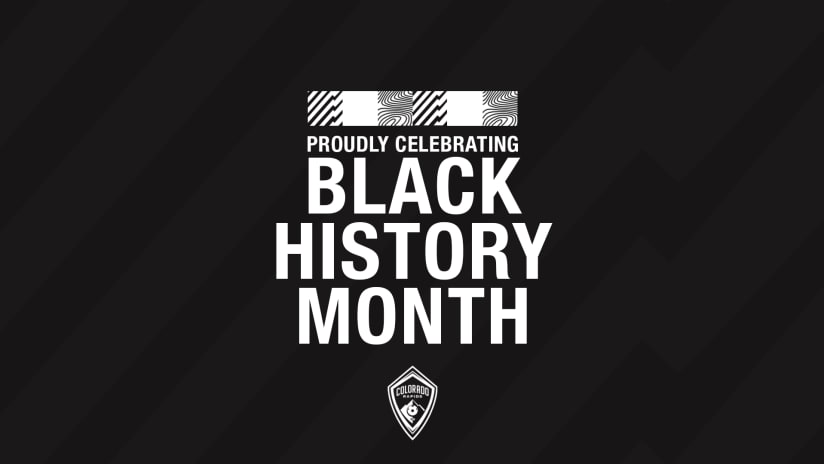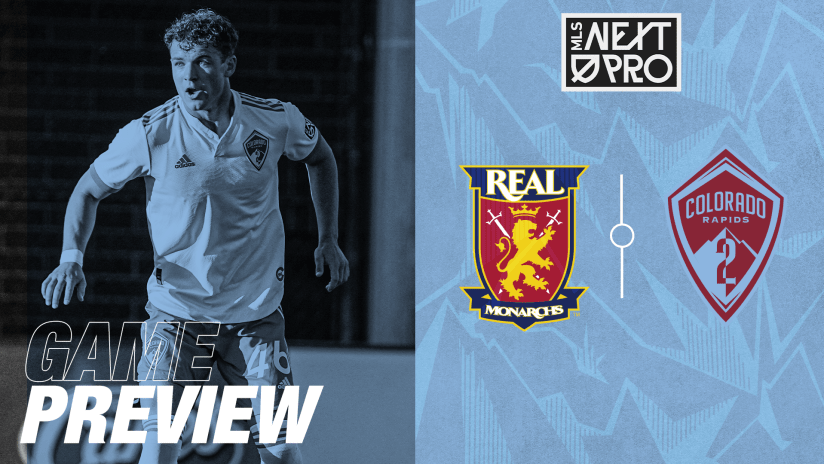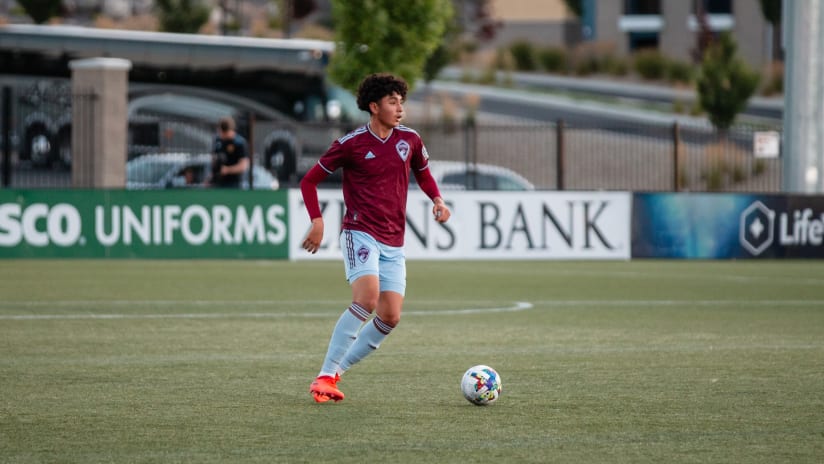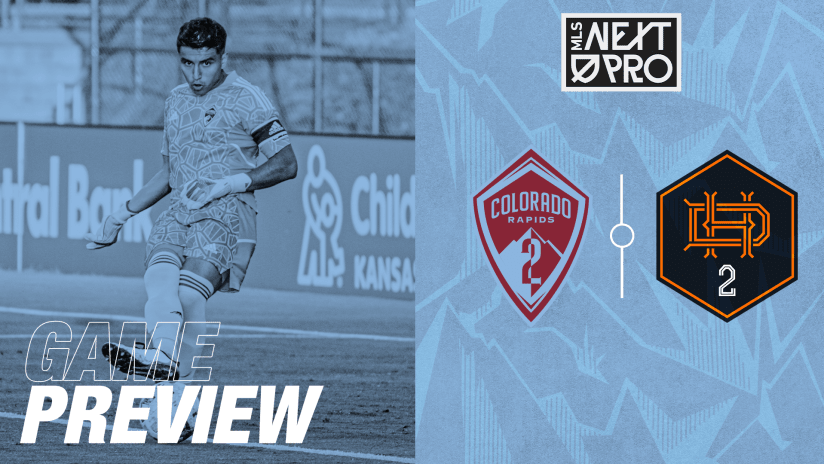In celebration of Black History Month, we sat down with members of our coaching staff and team to ask them about what this month means to them, and the legacy they wish to leave behind for future generations. Check out the full Q&A with head coach Robin Fraser, assistant manager Wolde Harris, striker Jonathan Lewis, midfielder Collen Warner and defender Auston Trusty here.
What does celebrating Black History Month mean to you?
Robin Fraser: If you need a month to celebrate an entire race of people, then it kind of tells you that it hasn't exactly been a level playing field. So it's a time to look at what blacks have achieved in this country. And how, how much how instrumental they've been in the development of this country. And it's just a time to celebrate it.
Wolde Harris: We're honoring the contribution of black people to the history of the United States, and their contribution to our society, and just highlighting that. I'm actually grateful for the people that came before me that paved the way for my rights and my privileges. It's definitely a good thing to honor them, and to lift them up and to be highlighted, and to have a period in time where they're recognized is very special.
Jonathan Lewis: Black History Month to me is about celebrating Black excellence, just making it known across the world that there's so much success in the black culture and just celebrating all the successes of black actors, black athletes, black leaders. And to me, it's just about black excellence, and just being able to look at all the people who came before me and made their way to the top and just it makes you really believe that anything is possible as black individuals, a black male, black woman, and knowing that success is within reach in the black community.
Collen Warner: I think it's a chance for the country as a whole to look back on the history of African Americans and what they've been through and I think more importantly, the things that they've accomplished in the past and also just how much there still is as a ways to go to fight for equality in society.
Auston Trusty: It means everything. It means just really looking back and really studying and really understanding the sacrifices it took for us to be where we are today in the world in our society. I grew up with a white mom, I grew up with a black dad, so I saw both sides of everything. I grew up with white friends, I grew up with black friends, I grew up with people from all different cultures and ethnicities and it's just amazing to see the progress we've made but there's still a lot of progress to go and that's really just the focus and understanding I have of Black History Month is to celebrate what we've done but also to push forward and move forward in what we need to accomplish.
Who are some Black figures that you saw as role models growing up?
RF: In terms of role models, as as a person, I think my parents more than anything else. I learned what I think is the most important lesson there is, which is treat people the way you want to be treated. And I watched my parents for a long time be absolutely gracious, whether they're talking to the most important people in the world, or what people perceive to be the least important people in the world. And it's something that's really resonated with me something I try to pass on to my kids, you treat people the way you want to be treated. And there was no better example of that than my parents.
WH: Obviously Muhammad Ali was in my era. Marcus Garvey is one that was really early as a Jamaican that came to the US and fought for civil rights as well. So those are two people that came come to mind immediately. Malcolm X is a big one and Martin Luther King is the most prevalent and most talked about, because he fought for a lot of the rights and privileges that we we enjoy today. From my own country, obviously, Bob Marley is influential and musical. And we, people from the Caribbean, obviously, have a big heritage in the United States as well. I like the fact that they're being recognized and that we get a moment in time to shine and and those people that have contributed to our society have been honored.
JL: I think as an athlete one of the big figures for me was Kobe Bryant. For me, he is someone that celebrated black excellence at the time where the NBA was going through a big culture change, and they were trying to not make it seem I guess you could say a "ghetto league". Kobe Bryant was the epitome of success for a black athlete, and then be at that time, where, you know, most coaches were white, most NBA All Stars were white. I would say that he rose to the top amongst fellow NBA players that weren't in the same social class as him or came from different backgrounds. So for me, he was someone that I looked up to, and he exuded black excellence among the NBA and most athletes.
CW: During my childhood, is was probably Malcolm X, and I read his biography when I was a little bit older. I just liked his story, because he was a person that kind of recreated himself a couple times over his lifetime and that's something that resonated with me.
AT: I had so many––Kobe Bryant's from Lower Merion, not too far from the town I grew up in, Michael Jordan, Jackie Robinson, Martin Luther King, LeBron James, I can just go on and on and on. There's so many influential black athletes, influential black celebrities, political people, just to honor and really celebrate what they have done. And you see LeBron James with the I Promise school, it's just, it's just so amazing. It's so cool. It makes you want to do it yourself. It's really, really inspiring. So I hope I can get to that point someday and I would love to do that. So that's the goal.
As a Black coach/athlete, what message would you want to give members of future generations who look to you as a role model yourself?
RF: Go find yourself another role model. No, just kidding. It would be that none of us is perfect, but you try to do things as well as you can try to represent yourself as well as you can, whether individually or collectively for the organization or for your family. I just don't think it's that hard to be kind and really try to instill that in my kids and I really try to live that my own life.
WH: Enjoy the privileges that you enjoy now, people made sacrifices before us in order for you to to have those privileges so don't take it for granted and work as hard as you can. Nothing comes easy without hard work. You have to make a sacrifice at some point in time and enjoy the journey. Put your nose to the grindstone and work.
JL: Just dream, believe big. Where I grew up I wasn't always the most fortunate kid. My parents taught me to just believe in your dreams, always work hard, and just never give up on whatever your dreams are. To get where you want to be successful, you have shoot for the stars. And even if you miss the stars you might land on the clouds and that's still excellence in your own way.
CW: Well, no matter their race, I think it's important for people to know where they come from, their identity, their family history is very important. You don't really think about it too much when you're younger, but I think the more you can learn about where you're from and your roots I think that gives you a better platform to know what you want to do in life and the type of person you want to be
AT: See, it's tough. I grew up in the suburbs, and when growing up in the suburbs soccer is a lot more available and if you grew up in the city soccer is not usually your go to, it's usually basketball, usually football. If you have the dream, if you really love soccer, you really enjoy playing it, just go for the dream and keep going because it'll come as long as you keep the right mindset, keep the right surroundings, and keep the love for the game. That's honestly the only thing holding you back, just keep the love of the game.





